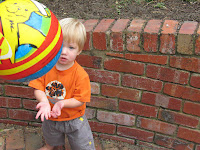A number of years ago I read a fantastic book by Stanley Greenspan called The Challenging Child. I had sought this book out to try and help me manage the behaviour of my Little Rascal. He was our second son and his personality was completely different to our eldest son. What had worked with our Thinker, was simply not working for Little Rascal. In the book he goes through the different child-types and gives an insight as to how they see the world that they are in. He then offers guidance on how to parent this child taking into account their strengths and talents.
Reading this book was great on two levels, firstly it made my issues seem insignificant compared to some of the case studies; and the second was that it taught me about the concept of “Floor time”. The books spends considerable amount of time going through this process, but in brief it is a:
“special unstructured time that you set aside for yourself and each child”.
It a 30 minute block of time, that in its entirety you have that child leading whatever activity he has chosen and he has your full attention.
Now at first I thought that I was giving each of them plenty of time like this (I had 2 boys and a newborn baby girl at this point), so I observed my own behaviour for a couple of days and what I found was that:
- Often I would choose the activity and instigate or lead the play.
- Sometimes I would go to and fro to the activity, as I completed chores as well (I am very fond of multi-tasking!)
- Would answer the phone if it rang.
- Would get distracted by the needs of another child.
So I made a concerted effort to have a dedicated 30 minute play session that was of his choice and led by him. How did this help me manage his behaviour you may ask? Well I got to understand him a little better. Through some imaginary play, I worked out that he found the noise levels of large groups agitating, “too loud” he would say. I also worked out that he wanted to do more for himself. “I can do this” was a common phrase to hear from him.
We (my husband also spent time doing the same thing as well) stuck at this for some months and then once I felt we had a better handle on things pulled back a bit. We used this format for our eldest when he was 7 and were trying to work through some stuff with him. He was very keen on chess at the time and we would generally spend the 30 minutes playing this. This planed time provided him with an open environment in which he talked easily and I got to find out some things that helped me manage his behaviour better. And he taught me how to play chess, which was a bonus!
At the moment, there is no issue (out of the ordinary that is!) that I am working on with any of the children, so we modify the practice a little. The modification means that the other children can participate in the time if they want to, but whose ever turn it is gets to choose the game and it is to be done their way.
For example backyard cricket is the most popular choice by the boys these holidays, but they have different preferences in the rules. Little Rascal will generally state that there you can’t go out first ball, there is “auto-wickie” (automatic wicket keeper for any edges behind the stumps) , you can run on overthrows and byes and that it is “running wicket” (you can be run out at either end). The Thinker is generally the opposite of this, but they both are happy to play in each other’s turn because they know that they get a chance to do this too. Possum prefers playing “mums and dads” at the moment and the boys then go and play cricket by themselves! Babaganouski is obsessed with cars and balls, so that is about all we do together. If we have had consecutive days were we have been out or had visitors and been unable to have the allocated time, one or all of the children will ask “when is it my time next?”
Planning time with each child sounds so simple that it needn’t be mentioned, but in a hurried world I enjoy the time that I take out from everything else to stop and play.

